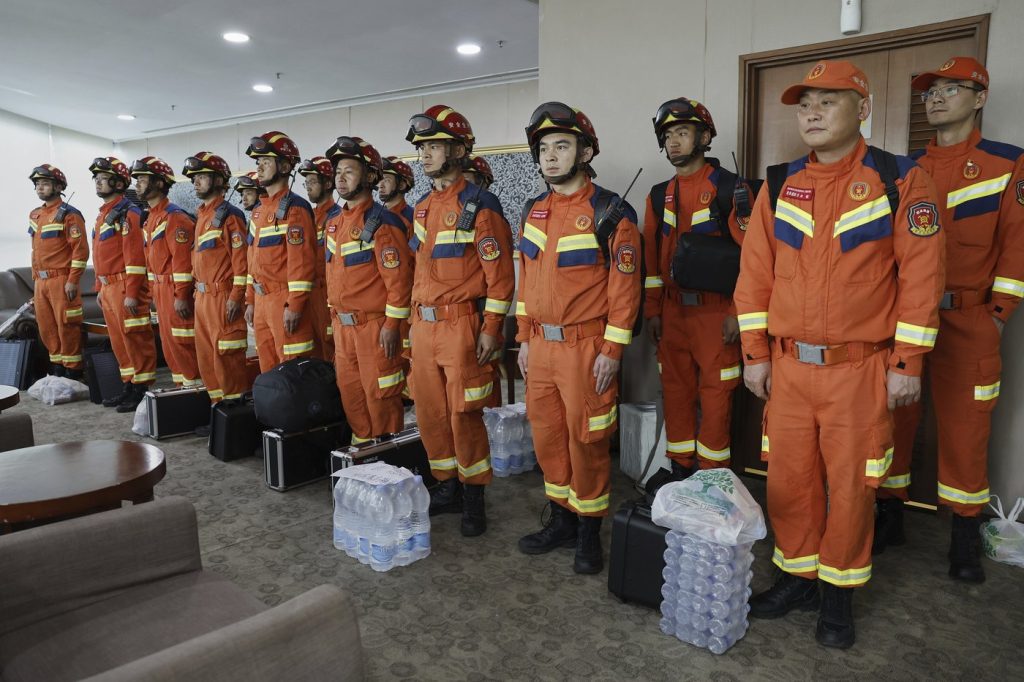BANGKOK (AP) – Emergency aid has poured into Southeast Asia in the wake of a devastating 7.7 magnitude earthquake that struck Myanmar and Thailand on Friday. The earthquake, which occurred near Mandalay, Myanmar's second-largest city with a population of 1.5 million, has led to an estimated death toll of 1,644 as of Sunday afternoon, with the number of injured reported at 3,408 and 139 individuals still missing.
In Thailand, the death toll increased to 17. Relief efforts are currently concentrated in Myanmar, where a severe lack of medical supplies has been reported. According to the U.N. Office for the Coordination of Humanitarian Affairs, essential items such as trauma kits, blood bags, anesthetics, assistive devices, and tents for health workers are needed urgently. Mohammed Riyas, the International Rescue Committee's Myanmar director, expressed concerns that it may take weeks to fully assess the earthquake's ramifications.
Countries have stepped up with direct assistance. A convoy of 17 Chinese cargo trucks carrying critical shelter and medical supplies was expected to reach Mandalay. China has pledged approximately $13.8 million in emergency aid and sent over 135 rescue personnel along with medical kits, generators, earthquake detectors, and drones. From Hong Kong, 51 search-and-rescue personnel, including firefighters and paramedics, along with two search-and-rescue dogs, were dispatched, bringing 9 tons of life-saving equipment. The Hong Kong government has earmarked HK$30 million ($3.9 million) from its Disaster Relief Fund for Myanmar.
Russia has also joined the humanitarian efforts by sending 120 rescuers together with medical specialists and canine units to Yangon, while India dispatched two C-17 military transport aircraft to deliver a field hospital unit and 120 personnel to establish a 60-bed emergency treatment center in Mandalay. Malaysia announced it would deploy 50 personnel to assist in identifying and aiding the areas most affected by the disaster. South Korea committed $2 million in humanitarian aid through international organizations.
In support of relief efforts, New Zealand's government will collaborate with the International Red Cross Movement. The European Commission announced it would disburse 2.5 million euros ($2.7 million) in initial emergency aid, raising the European Union's total humanitarian funding for Myanmar to more than €35 million ($37.8 million) this year. Ireland pledged to provide an aid package of €6 million ($6.49 million), which includes €3 million ($3.2 million) allocated to the International Federation of the Red Cross and the Myanmar Red Cross Society.
Despite the influx of international support, aid agencies suggest that local hospitals are overwhelmed with the number of injured and struggling due to insufficient medical supplies. Cara Bragg, the manager of Catholic Relief Services in Myanmar, stated that local volunteers have been primarily engaged in finding missing loved ones amidst the chaos. The U.N. humanitarian office reported mobilizing $5 million from a Central Emergency Response Fund for critical assistance. The International Federation of Red Cross and Red Crescent Societies also released 2 million Swiss francs ($2.2 million) in emergency funds to support its operations in Myanmar.
The situation in Myanmar and Thailand remains dire as governments and international organizations continue to assess needs and deliver essential supplies. Actors from various nations are collaborating towards providing relief and addressing the urgent humanitarian crisis caused by this catastrophic earthquake.










